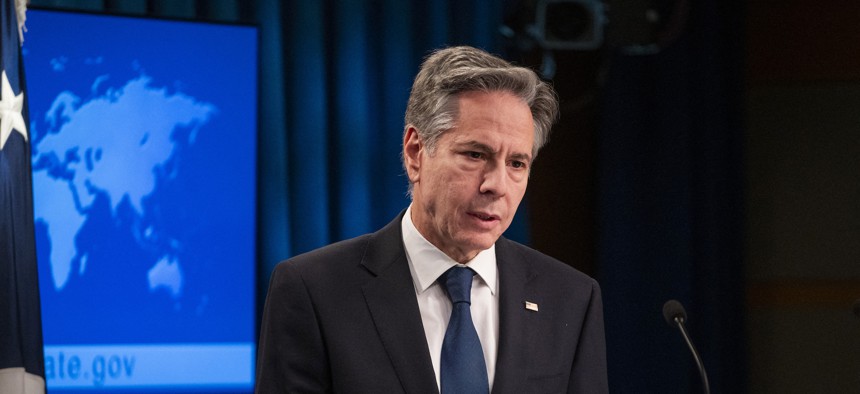State Department to levy visa restrictions on spyware abusers

U.S. Secretary of State Antony Blinken, shown here at his year-end press conference at department headquarters on Dec. 20, 2023, initiated a new policy that allows the withholding of entrance visas to individuals involved in the use of spyware. ROBERTO SCHMIDT/AFP via Getty Images
The move builds on several actions taken by the Biden administration in the past year to counter abusive commercial spyware practices.
The State Department implemented a new policy on Monday that would allow the U.S. to impose visa restrictions on individuals involved in commercial spyware abuses.
The policy establishes that State can evaluate and potentially deny visas on a case-by-case basis to those “believed to have been involved in the misuse of commercial spyware” or those that may have facilitated such misuse, in addition to immediate family members. It comes amid a slew of recent actions rolled out by the Biden administration to curtail abusive spyware practices carried out by foreign governments toward journalists, political activists and dissidents.
The move also comes after a report last week from Human Rights Watch, which stated that two of its employees were targeted in Jordan by Israeli-made NSO Group Pegasus spyware.
“The misuse of commercial spyware threatens privacy and freedoms of expression, peaceful assembly, and association. Such targeting has been linked to arbitrary detentions, forced disappearances, and extrajudicial killings in the most egregious of cases,” Secretary of State Anthony Blinken said in a statement.
The rules target people “developing, directing, or operationally controlling companies that furnish technologies such as commercial spyware to governments, or those acting on behalf of governments,” an agency release said. It was not immediately clear whether the restrictions would trickle down to developers based in countries like Israel, a major hub for spyware technologies that is among the list of nations whose citizens do not need a visa to enter the U.S. in ordinary circumstances for limited periods of time.
A senior administration official declined to comment on whether the State Department had started writing out a list of individuals covered by the ban, Axios reported.
The Biden administration in July added the foreign commercial spyware companies Intellexa and Cytrox to a restriction list that prohibits American firms from engaging in certain business activities with them, after determining they threaten U.S. national security and foreign policy interests.
That move built on U.S. actions in November 2021, when NSO and Candiru were added to a federal blacklist when it was determined the phone hacking tools had been used by foreign governments to target government officials, academics, journalists and others.
The White House has previously said that foreign governments have used spyware to target U.S. personnel.
The U.S. and allied nations in March unveiled a pledge seeking to counter spyware abuses. President Joe Biden that same month also signed an executive order prohibiting federal agencies from using commercial spyware technologies in a way that may enable human rights abuses or compromise national security.






